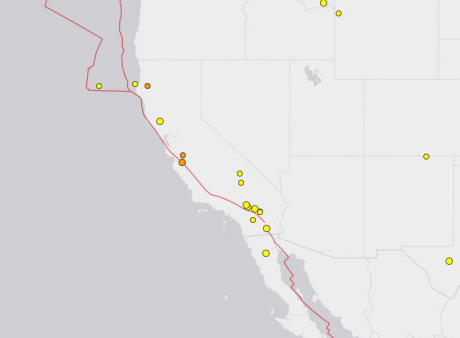Posted: 14 Nov 2017 Michael Snyder THE ECONOMIC COLLAPSE BLOG
For decades the west coast of North America has been relatively stable compared to the rest of the Ring of Fire, but now that is changing.
So should those living along the west coast be on alert? Without a doubt, the shaking that happened on Monday definitely got a lot of attention…
A 4.6-magnitude earthquake rattled Monterey County on Monday and was felt more than 90 miles away in San Francisco, officials said.Some experts are trying to assure us that we have nothing to be concerned about, but others are claiming that an earthquake swarm such as this “dramatically increases the likelihood of a major quake in California”. And not too long ago, the director of the Southern California Earthquake Center did admit the following…
The quake hit at 11:31 a.m. about 13 miles northeast of Gonzales, near Salinas, and was followed by nine smaller aftershocks, with the largest measuring magnitude 2.8, said Annemarie Baltay, a seismologist with the U.S. Geological Survey in Menlo Park.
‘Any time there is significant seismic activity in the vicinity of the San Andreas fault, we seismologists get nervous,’ Thomas Jordan, director of the Southern California Earthquake Center, told the LA Times last year.Hopefully the shaking on the west coast will settle down and this will turn out to be a false alarm.
‘Because we recognize that the probability of having a large earthquake goes up.’
However, seismologists have warned us that the 800-mile-long San Andreas fault “could unzip all at once” without warning someday. The following comes from Fox News…
For years, scientists believed the mighty San Andreas—the 800-mile-long fault running the length of California where the Pacific and North American plates meet—could only rupture in isolated sections.And just like we witnessed in Japan, a massive earthquake offshore could produce an enormous tsunami which could potentially “wash away coastal towns”. The following comes from the Los Angeles Times…
But a recent study by federal, state and academic researchers showed that much of the fault could unzip all at once, unleashing a rare, singular catastrophe. Now, insurers have used that research to come up with a new analysis of the damage that could be caused by statewide break of the San Andreas.
If a 9.0 earthquake were to strike along California’s sparsely populated North Coast, it would have a catastrophic ripple effect.Scientists don’t know exactly when it will happen, but they promise us that “the Big One” is coming someday.
A giant tsunami created by the quake would wash away coastal towns, destroy U.S. 101 and cause $70 billion in damage over a large swath of the Pacific coast. More than 100 bridges would be lost, power lines toppled and coastal towns isolated. Residents would have as few as 15 minutes notice to flee to higher ground, and as many as 10,000 would perish.
Scientists last year published this grim scenario for a massive rupture along the Cascadia fault system, which runs 700 miles off shore from Northern California to Vancouver Island.
And based on all of the shaking that has been taking place lately, we may be a lot closer to that day than many imagined.
Michael Snyder is a Republican candidate for Congress in Idaho’s First Congressional District, and you can learn how you can get involved in the campaign on his official website. His new book entitled “Living A Life That Really Matters” is available in paperback and for the Kindle on Amazon.com.




